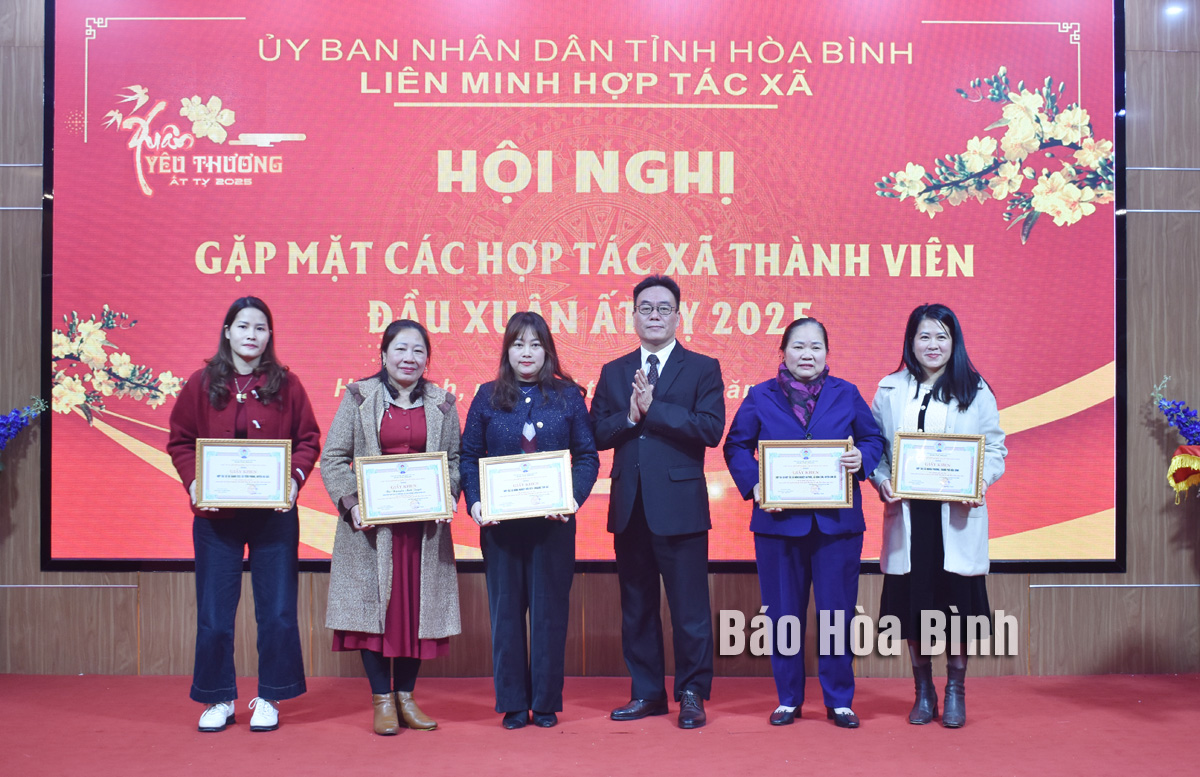
The Hoa Binh Cooperative Alliance held a New Year meeting with its member cooperatives on February 25 to review past achievements and outline future goals.
Leaders of the provincial Cooperative Alliance hand over certificates of merit
to individuals with outstanding achievements in developing the collective
economy.
In 2024, significant efforts were made by local authorities to address
challenges and foster the growth of the collective economy and cooperatives. As
a result, 63 new cooperatives were established, surpassing the annual target by
80%, while seven cooperatives were dissolved. By the end of the year, the
province had 174 cooperative groups, 602 cooperatives, and three people's
credit funds, of which 166 cooperative groups, 525 cooperatives, and all three
credit funds were operating.
The
average revenue per cooperative reached 1.58 billion VND (61,815 USD), with an
average profit of 174 million VND, marking increases of 4.34% in revenue and
6.09% in profit compared to 2023. Additionally, the average monthly income of
cooperative members and workers rose 2.86% year-on-year, reaching 4.67 million
VND per person. Cooperatives continued to play a vital role in rural,
mountainous, and disadvantaged areas by supporting households in economic
development, creating jobs, enhancing product value and contributing to poverty
reduction while ensuring social security.
In its
efforts to provide consultancy and support, the provincial Cooperative Alliance
organised 30 seminars on legal policies, cooperative establishment procedures,
and business promotion. It also assisted four cooperatives in showcasing their
products at key events, including the "CoopStar Awards 2024" and the
Forum on Cooperative Economy 2024 hosted by the Vietnam Cooperative Alliance
(VCA).
For 2025, the alliance has set ambitious goals, including a 2% increase in
membership. It will conduct inspections and provide advisory services for at
least 20 member cooperatives to ensure compliance with the Cooperative Law
2023. Additionally, it will support 10 cooperatives in successfully organising
their annual meetings, serving as models for replication. Further efforts will
focus on expanding market access, with plans to assist 30 cooperatives in
participating in trade promotion programmes and business networking
opportunities.
On this occasion, the VCA honoured six individuals with the insignia "For
the Cause of Cooperative Development." Meanwhile, the provincial
Cooperative Alliance presented certificates of merit to five collectives and
four individuals in recognition of their oustanding contributions to the growth
of the collective economy.
With an increasingly vibrant and widespread emulation movement aimed at building cultured residential areas and cultured families, Yen Thuy District has been making steady progress toward improving both the material and spiritual well-being of its people, while fostering a civilized, prosperous, beautiful, and progressive community.
Once lacking recreational spaces and community facilities, Residential Group 2 in Quynh Lam Ward (Hoa Binh City) has recently received attention for the construction of a new, spacious, and fully equipped cultural house. The project followed the model of state support combined with public contributions in both labor and funding.
The "All people unite to build cultural life" movement, which has been effectively integrated with Kim Boi district’s socio-economic development goals, is fostering a lively spirit of emulation across local residential areas, hamlets, villages, public agencies, and enterprises. In addition, through the initiative, traditional cultural values are being preserved and promoted, while community solidarity and mutual support in poverty reduction and economic development are being strengthened.
A working delegation of the Hoa Binh provincial People’s Committee led by its Permanent Vice Chairman Nguyen Van Toan on June 11 inspected the progress of a project to build the Mo Muong Cultural Heritage Conservation Space linked to tourism services in Hop Phong commune, Cao Phong district.
Born and growing in the heroic land of Muong Dong, Dinh Thi Kieu Dung, a resident in Bo town of Kim Boi district, in her childhood was nurtured by the sweet lullabies of her grandmother and mother. These melodies deeply imprinted on her soul, becoming an inseparable part of her love for her ethnic group's culture. For over 20 years, this love for her hometown has driven Dung to research, collect, and pass down the cultural values of the Muong people to future generations.
In the final days of May, the Ethnic Art Troupe of Hoa Binh Province organized performances to serve the people in remote, mountainous, and particularly disadvantaged areas within the province. These were not just ordinary artistic shows, but they were the meaningful journeys aimed at spreading cultural values, enhancing the spiritual life of the people and contributing to the preservation of ethnic minority cultural identities.



